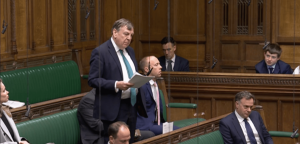The UK has a proud record on climate action, being the first major economy to legislate to achieve net zero by 2050. I welcome the Prime Minister’s Ten Point Plan which will allow the UK to forge ahead in eradicating the UK’s contribution to climate change.
As included in the plan, the UK will produce enough offshore wind to power every home, quadrupling how much we currently produce to 40GW by 2030, thereby supporting up to 60,000 jobs. The Government will work with industry and aim to generate 5GW of low carbon hydrogen production capacity by 2030 for industry, transport, power and homes. In addition, the Government aims to develop the first town heated entirely by hydrogen by the end of the decade. The UK will also become a world leader in carbon capture technology to store harmful emissions away from the atmosphere, with a target to remove 10MT of carbon dioxide by 2030, equivalent to all emission of the industrial Humber today, through £200 million investment. Finally, from £525 million investment in nuclear as a clean energy source this will develop the next generation of small and advanced reactors which could support 10,000 jobs.
Other parts of the plan include a target to install 600,000 heat pumps every year by 2028, £1 billion funding to make our schools, hospitals and homes more energy efficient, planting 30,000 hectares of trees every year, promoting and investing in zero-emission transport and £20 million to develop clean maritime technology. The plan also includes a pledge to end the sale of new petrol and diesel cars and vans by 2030, while the sale of some hybrid cars and vans will continue until 2035.
This plan will mobilise £12 billion of Government investment to create and support 250,000 highly-skilled green jobs across the UK. It is expected to spur over three times as much private sector investment by 2030.
I know the Government’s International Climate Finance commitment has seen several projects established around the world in which the UK supports developing countries tackle climate change. One example of a project is the UK PACT (Partnering for Accelerated Climate Transitions), a bilateral capacity building programme, which responds to the critical global need to build the capacity of countries to accelerate the implementation of their Nationally Determined Contributions (NDCs). With £60 million between 2018-2021, UK PACT works with high-emission, high-ambition developing countries through bilateral programmes, skill-shares and a global challenge fund.
As the UK hosts COP26, we are bringing together world leaders, climate experts, business leaders and citizens to agree ambitious action to tackle climate change.


